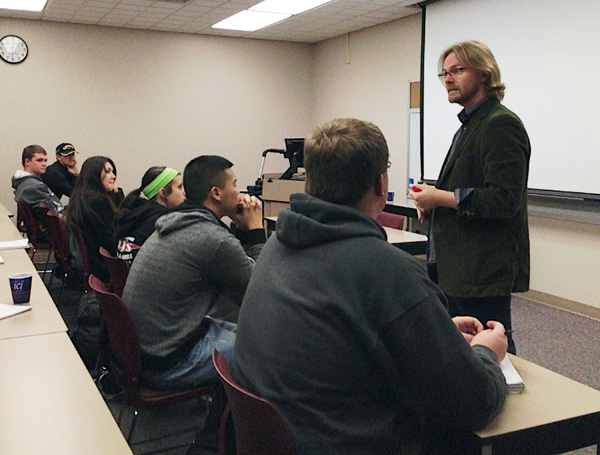
Professor Tadd Ruetenik from St. Ambrose University speaks about the meaning of YOLO and how it can apply to their lives at DMACC Building 7 on Nov. 14.
By Martina Gutierrez
Philosopher and Professor Tadd Ruetenik from St. Ambrose University in Davenport, Iowa came to speak at DMACC Ankeny campus Thursday, Nov. 14.
Since 1998, Professor Ruetenik has given over 20 presentations at philosophy conferences around the country. Professor Ruetenik came to DMACC after he was invited by his friend, DMACC Professor Jason Hills from the Society for the Advancement of American Philosophy, a conference of philosophers who meet every year to share ideas.
Ruetenik explains his topic “YOLO” (You Only Live Once) as that both superficial (since it often deals with naive people), and also incredibly deep, since the meaning of life has been a topic for philosophers for centuries.
“YOLO therefore you should maximize your pleasure in life.” He added that there is something fundamentally wrong with this philosophy itself.
“Those who believe YOLO is the meaning of life, are misunderstanding what life is. One does not ‘have’ a life; one ‘lives’ a life, yet the YOLO person seems to think that life is something that is packaged up for consumption,” Ruetenik said.
Life is like a race according to Ruetenik. If you only live once, you never actually see yourself completing the race if this is the only life you have. Imagine life is a race. Say there is a long distance runner, running a 400 meter race (1 lap around a track). The beginning is birth and going all the way around is completing the race (and life). One person may take their time running around the track and at the finish line, they can say they finished the race.
On the other hand, he explains, for a sprinter running a short distance is only focused on the race itself and never really sees themselves finishing the race. It is as if a brick wall is at the other end with the finish line, and this particular person is running so fast they never got to look back at their life to see if they even finished the race. This is what Ruetenik calls a “YOLO” person.
Life is not just about pleasure but about experience in general. The YOLO believer is one who does not live for the rush of racing, the rush of skydiving for example, but the experience of it.
Making a bucket list of things to do in life before you die is a life all about the list, in which case YOLO makes sense.
Death could end all experiences for a YOLO person and yet would not be a tragedy because they would not live to feel the disappointment. In this sense there is no difference with the YOLO sprinter who never even lives once, but the successful YOLO sight-seer (the Epicurus) one who has in fact filled out his bucket list and feels he could die now.
Ruetenik argues, in a sense he has died already; when a person lives a life through the bucket list before they die, is considered a person who has died already. When life is all about completing the list, this person ends up killing off the meaning of life.
Our culture is set up to encourage YOLO; to seek pleasure because it wants to sell us products (cars, music, movies, etc.).
Most think you can just “grab life by the horns.” We cannot grab life and we are never in the position to grab our own life, but our consumer culture wants us to think that life is something they can sell to us. So it’s not surprising that YOLO people will talk about doing something irresponsible, like drugs or alcohol.
Ruetenik does not believe in fate or free will. “Free will is the absence of explanation for why we do something. If we do something for free will, we are doing it for no reason what’s so ever. It’s purely random, like standing on a table, acting like a gorilla,” Ruetenik said.
Ruetenik was impressed with the audience.
“I was quite impressed with the level of engagement from the students. Many people both understood what I was saying, and were able to add to it, and even challenge me on some ideas. This is invigorating for a philosopher,” he said.





Comments